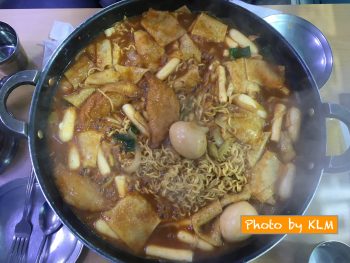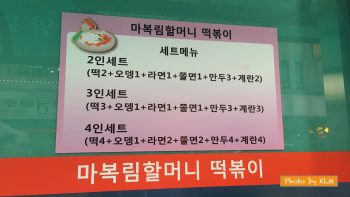A Popular 떡볶이 (a spicy rice cake dish) Restaurant in South Korea Posted by Kyung-Hwa on Nov 2, 2017 in Korean Language, Vocabulary
Do you remember when I mentioned about a spicy rice cake dish called 떡볶이 (Tokbokki) which is an addictive Korean snack for many people? In this post, I will introduce you to one of the most popular stops for a 떡볶이 dish in Seoul.
You can grab delicious 떡볶이 (Tokbokki-a spicy rice cake dish) in many places in Korea, however 마복림 할머니 떡볶이 (Grandma Maboklim’s Tokbokki) restaurant is one of the most well-known stops for this mouthwatering 떡볶이 dish. This restaurant is located in 신당동 떡복이 타운 (Shindang-dong Tokbokki Town) in Seoul. Although there are many 떡볶이 restaurants in the area, this restaurant, 마복림 할머니 떡볶이, has over 50 years of history, and many people stand in line to enjoy this restaurant’s delicious 떡볶이.
If you plan a visit to this restaurant in the future, the following list of Korean words will be helpful when you order. You can choose from a 세트메뉴 (set menu) depending on the number of people in your group, and you can also add your choice of extra items from the 단품메뉴 (single item menu) to your세트 메뉴.
- 세트메뉴 (set menu – it means combo/value set)
- 2인 세트 (two portion – it’s direct translation is a set for 2 people )
- 3인 세트 (three portion – it’s direct translation is a set for 3 people )
- 4인 세트 (four portion – it’s direct translation is a set for 4 people)
- 떡 (rice cake)
- 오뎅 (fish cake)
- 라면 (Ramyun: instant noodles)
- 쫄면 (a kind of chewy Korean noodles)
- 만두 (Korean dumpling)
- 계란 (egg)
- 밥 (cooked rice)
- 단무지 (pickled radish)
Also, the following expression will be very useful to remember when you order your dish or if you need to ask something.
- “________ 주세요.” (________, please.)
− Its direct translation is “Please give me ________.”
− This is an important survival phrase to remember to survive in Korea. It is a polite way to ask for something; you can add this phrase at the end of the sentence.
ex) 떡볶이 주세요. (Topbokki, please.)
물 주세요. (Water, please.)
떡볶이 is an inexpensive dish to enjoy as a group, and it is exciting to watch 떡볶이’s beloved ingredients simmer in a delicious 고추장 양념 (red pepper paste seasoning) at your tableside. You can also practice the phrases from the last post, “it’s delicious, its spicy, it’s not spicy.” while you enjoy this beloved Korean dish 떡볶이 with your friends and family.
감사합니다! (Thank you!)
***Related Vocabulary***
- 떡볶이 (Tokbokki-a spicy rice cake dish)
- 마복림 할머니 떡볶이 (Grandma Maboklim’s Tokbokki)
- 신당동 떡복이 타운 (Shindang-dong Tokbokki Town)
- 세트메뉴 (set menu – it means combo/value set)
- 단품메뉴 (single item menu)
- 2인 세트 (two portion – it’s direct translation is a set for 2 people )
- 3인 세트 (three portion – it’s direct translation is a set for 3 people )
- 4인 세트 (four portion – it’s direct translation is a set for 4 people)
- 떡 (rice cake)
- 오뎅 (fish cake)
- 라면 (Ramyun: instant noodles)
- 쫄면 (a kind of chewy Korean noodles)
- 만두 (Korean dumpling)
- 계란 (egg)
- 밥 (cooked rice)
- 단무지 (pickled radish)
- 고추장 양념 (red pepper paste seasoning)
- “________ 주세요.” (________, please.)
- Its direct translation is “Please give me ________.”
- This is an important survival phrase to remember to survive in Korea. It is a polite way to ask for something; you can add this phrase at the end of the sentence.
ex) 떡볶이 주세요. (Topbokki, please.)
물 주세요. (Water, please.)

Build vocabulary, practice pronunciation, and more with Transparent Language Online. Available anytime, anywhere, on any device.






